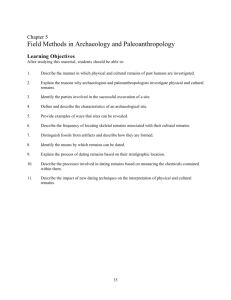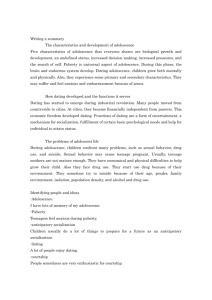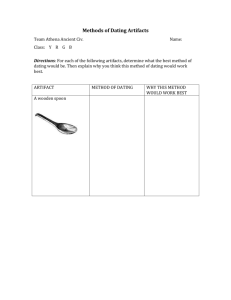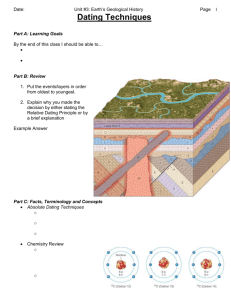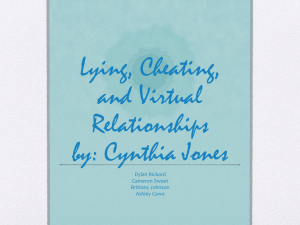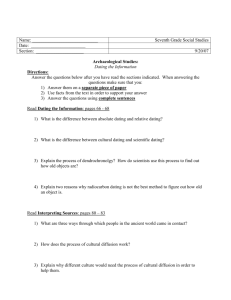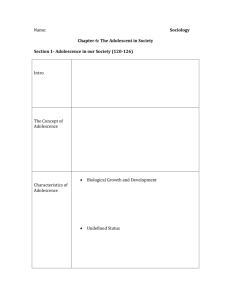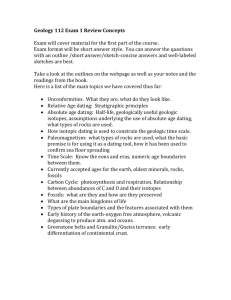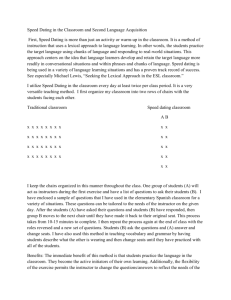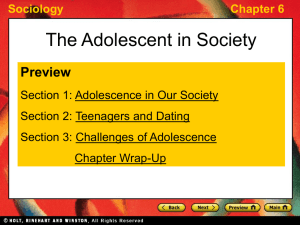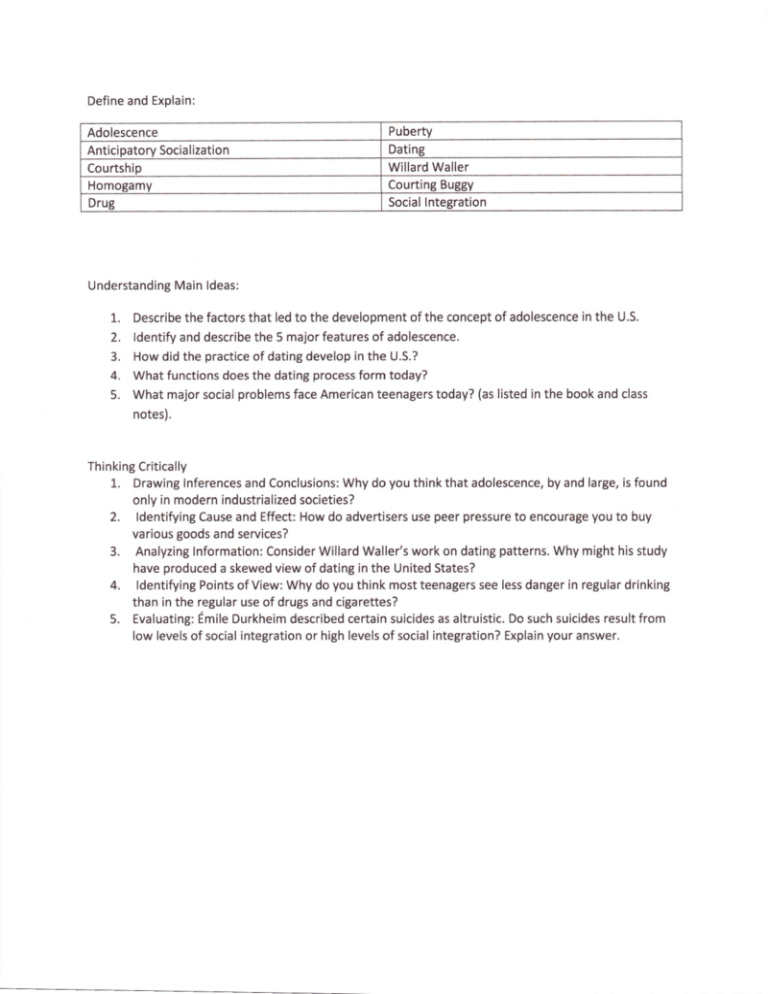
Define and Explain:
Adolescence
Puberty
Anticipatory Socialization
Courtshio
Homosamv
Willard Waller
Courting Bussv
Drug
Social lntesration
Dating
Understanding Main ldeas:
1. Describe the factors that led to the development of the concept of adolescence in the U.S.
2. ldentify and describe the 5 major features of adolescence.
3. How did the practice of dating develop in the U.S.?
4. What functions does the dating process form today?
5. What major social problems face American teenagers today? (as listed in the book and class
notes).
Thinking Critically
Drawing lnferences and Conclusions: Why do you think that adolescence, by and large, is found
only in modern industrialized societies?
ldentifying Cause and Effect: How do advertisers use peer pressure to encourage you to buy
various goods and services?
Analyzing lnformation: Consider Willard Waller's work on dating patterns. Why might his study
have produced a skewed view of dating in the United States?
ldentifying Points of View: Why do you think most teenagers see less danger in regular drinking
than in the regular use of drugs and cigarettes?
Evaluating: Emile Durkheim described certain suicides as altruistic. Do such suicides result from
low levels of social integration or high levels of social integration? Explain your answer.
1.
2.
3.
4.
5.
I-)ate
Class
Name
Review Worksheet
The Adolescent in SocietY
ifrUtTlPLE CHOICE In each blank, write the letter of the choice that best completes the
statement or answers the question.
!.
The physical maturing that makes an individual capable of sexual
reproduction is
a- adolescenceb. puberty.
c
homogamy.
d. adulthood2. Learning the rights, obligations, and expectations of a role in preparation for
assuming that role in the future is called
a. maturiry
b. social integration.
c
adolescence.
d. anticipatory socialization5. In his study,WillardWallace concluded that dating
a- had little to do with mate selectionb. had a lot to do with mate selectionc. was highly structured.
d. was based on the traits of dependability and honesty.
4. Homogamy reflects the importance of
a- having fun together
b. Iooks
c. status attainment
d. character
in spouse selection.
-
5. AII of the following statements are true of AIDS EXCEPT
a. It can be fatal.
b. It is sexually transmitted.
c It attacks the immune system.
d. Studies show that teenagers are generally rot aware of the dangers
AIDS.
6. Which of the following is NOT considered a drug?
a. cocaine
b. alcohol
c- marijuana
d. aspirin
C"opyright
@
b,I Holt, Binehart md Winston. All
Hoh sociology
righs
reserued-
of
SHORT ANSSTER Answer the questions in the space provided.
7.
\^lhy are the beginning and end dates for adolescence somewhat blurred?
& \i/hat three ftctors
have helped distinguish adolescence as a life stage
in the United
States?
9. Describe some sources of pressure on adolescents-
lO. Compare the main purpose of courtship to that of dating.
I
I.
Describe some characteristics of contemporary dating
patterns._
12- Identi& six negative consequences that are more likely for teenage than for adult
pregnancies.
IiI.
Describe three key factors associated with teenage drug use-
lll.
List seven social factors that appear to affect the rates of teenage suicide.-
Copyri8h e by Holt, RindErt andYlqlrn. All rights reserved
nortus for a dal's productiou. They'
enlbrced llrese nonns srth sanctions. The
intbnrral slructure n'as rnore irnportant
than the fornral structurB lo the indiridual
*orkers.
22. According to Robert Nlichels. the iron larr
of oligarchy is dre tendenc!' of orgaiizations to becoore ilrcreasingll- dorninared
b,r- srnall groups of people"
thenrseh-es.
13. Ke1' tactors in teen drug use are haling
friends uho regularll'en*sage iu drug use.
Ghapter 5
hating social and academic adjurtmeat
prohlenrs- ard litirrg in a hostile arld
so(f{IJzil:sc Tnm niDnmt'.rL
l.d
l[.
2.c
1t" I
3-a
13.
nre
.[. b
5.d
1"1.
tarill-
Eeneralized other
16.
lO. prinrary
Peer
17. school
personaiitl'
9, looking-glass
r*jectirrg lamilr setling"
14" Tnre lhctors identit-red b,v r*searchers
Neiger and Hopkiu include alcohol or
drug use" triggerin_e r1'ent$. a_se" sd]L
populalion densitl-" tanrily nelations- and
the cluster etTeci"
15" deliberare
7. socialization
8.
12" Negatile consequences that are more
lilel1' for t.eruee pregnancies include
lorrer birth rales. inthnt deatlr- deatli of
the urother duriag childbirttl lort'er
educational attainrnent tar thR parerlls
ald thus lou'er litbtime earaings- leaming
di&-rculties among the children. a:rd risk
ofthe children beconring teen parents
seH
18. nmss media
19. total institution
20. Resocialization
Chapter 7
THE ADI..,I.T IN SOCIETY
Ghaphn 6
[" The most irnportant task of,nren in ttre
eull' adult trzursirion period is learing
ffiE
2, NIen der-elop a dreanr ofadult
"t"
home" troth phl,sically and psJ-claologically.
ADOLESCEIiIT IN SOGETT
b
2.d
3-a
4.c
5"d
6.d
'?. Pubertl- and acceptance irrto
accornplishment. almost al.n'4 s piuared
in termrs ot-occupational goals and ofterr
wrrealistic"
the adult
rrorld occur at dittlrent times
fq
3, A menlor is sorneone rrho
di&erent
people.
8. The tlree lhdors ale education. exclusiorr
and helping ihe person achiete those
dreaurs- I-sualll'th. firemor is an older.
erperienced persolr in the u'orld of t'ortri.
Ttrre urentor acts as a role model and helps
the indilidual grn started in adult life"
of 1-outh lrom the labor frce. and der-eloprnent ofthe juvenile justice s-1'stem.
9, Pressures colre *o:r parental rules.
school- peers- relationships. jobs- and
conllictine roles.
1{}- The purpose ofcourtship uas erentual
marriage. \l'hile datilg ural'lead to
.1. The three phases are lear ing the famil)
ruarriage. its rrain purpose is .rltertaitrnent and arn$semeut. at least ilr the
casual :taees.
11" Conternporary datilg is inlbnnal and has
no set stases. It i:xoh-es flexrbiliq- and
greater equaliry' betu-een the sexes,
Relationships ar* based on friendship. ald
the group-rather ihan the couple- is dre
ruost inrportant focus of interaction-
Col4rrglr e bv Holt, Rnehart ad \tr-nston -{ll rigtcs
l-lolt Sociology
t'oeiers an
i.ndir-idual's derelopment b1- b*lieling in
the person- sharing the person's dreanrs.
-
entrring the adult u-orld- and enteriug the
adult u'orld again
5. Farrale de'r'eloprlrent is dift'ererrt itorn
nrale derelopment in n'omen's emphasis
orr narriase o1?r career irr Phase L in the
breali in enrplo,r-ment that o€curs during
Phase II. and in u-ourerr's corrrruitnrent lo
lheir careers in Phase III at a ti.ure tten
men are begirurine to hare serious doubts
about rheir o\\'tl care.rs.
rxm:d
(39)
Cf6pbr Review Acliuities

